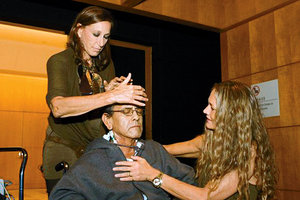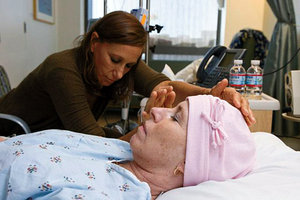By meshing a 3,000-year-old medicine with cutting-edge medical science, one of the largest medical institutions in California is hoping to lead the way by proving there are effective ways to deal with disease with a new type of care that incorporates both East and West.
These days, officials within the UCLA Health System are busy teaching caregivers and its medical staff aromatherapy, Reiki, yoga and Traditional Chinese Medicine by incorporating a new initiative called the Urban Zen Integrative Program, which will help the hospitals affiliated with UCLA learn to blend Western and Eastern medicine into one for the benefit of their patients and staff's health on a physical and psychological level.
Blending Two Worlds
The UCLA Health System is no stranger to Eastern medicine. Two of the early pioneers were The Center for East-West Medicine and Simms/Mann UCLA Center for Integrative Oncology, both centers are known as champions for Traditional Chinese Medicine in the clinical, educational and research levels before it was offered as an option to the rest of the medical staff.
As a UCLA undergrad in 1971, East-West founder Ka-Kit Hui, M.D. envisioned a center that would demonstrate the value of Traditional Chinese Medicine in the clinical arena. The Western reaction to acupuncture anesthesia (AA) propelled Hui to prove the effectiveness of Traditional Chinese Medicine by bringing in research directly from the source.
"Unlike most people in the world of Chinese medicine, in this country, most people do not read Chinese," said Hui "They have not been able to read work from the integrators in China who have been doing this research with Chinese medicine and published in Chinese journals."
 Donna Karan at the Urban Zen Center in NY
In bringing TCM to a dominant Western healthcare system, Hui was once met with resistance on both sides. Eastern colleagues feared modernizing Chinese Medicine would in a sense "Westernize" it and the whole model could be lost in translation. Critics from the West wanted proof of the therapies' effectiveness.
Donna Karan at the Urban Zen Center in NY
In bringing TCM to a dominant Western healthcare system, Hui was once met with resistance on both sides. Eastern colleagues feared modernizing Chinese Medicine would in a sense "Westernize" it and the whole model could be lost in translation. Critics from the West wanted proof of the therapies' effectiveness.
"It was thought to be quackery, some people looked at me and initially thought I was crazy," recalled Hui.
Now, over 500 UCLA physicians refer outpatients with chronic illnesses including rheumatology, neurology and oncology to the East-West Clinic.
"We are trying to move away from the disease-based model, and look how Chinese medicine treats the whole patient," said Hui.
Anne Coscarelli, director of the Simms/Mann UCLA Center for Integrative Medicine believes traditional Western medicine is not enough to help a patient achieve a full recovery from cancer and helped bring Eastern therapies to patients at the center to help them achieve overall better health.
"This is where healthcare is going, where there is a not a separation system, it is the integration center, our oncologists rely on this and want someone in clinic with them. If they have a distressed patient they hope to do something other than write a psychotropic mediation, an anti-anxiety or Ativan," said Coscarelli.
A cancer diagnosis can also have a deep impact on the psyche for many patients at the clinic. A lot of cancer patients not only experience side effects from chemotherapy, but also stress about uncertainties and fears that arise from the initial diagnosis. Oncology patients are offered therapies and group sessions in art therapy, mindfulness, and principles of relaxation, stress management, qi gong and most recently acupressure.
Hui and Coscarelli agree in the preventative qualities Traditional Chinese Medicine offers to their patients and have been on board with helping other physicians incorporate the techniques.
 Photos courtesy UCLA Health/Reed Hutchinson
"It is preventative. You can solve a problem by massage and acupuncture, rather than taking pills and then surgery," said Hui.
Photos courtesy UCLA Health/Reed Hutchinson
"It is preventative. You can solve a problem by massage and acupuncture, rather than taking pills and then surgery," said Hui.
Medical experts at UCLA believe Eastern therapies will not only affect mind-body wellness, but also be more cost-effective. U.S. healthcare costs stand at over $2 trillion annually according to the National Health Statistics Group. Health policy journal Health Affairs accounts half (51 percent) of health expenditures to hospital care and physician/clinical services.
"I believe that these types of programs would save our UCLA Health System, hundreds of thousands of dollars," said UCLA Health System President and Chief Executive Officer David T. Feinberg, M.D., M.B.A.
Bringing Urban Zen to UCLA
In order to ensure that almost all 10,000 staff members and 2,000 physicians across the UCLA Health System are also well equipped with Eastern medicine techniques to recommend to those in their 790 inpatient beds, for the past two years they have been given the option to attend the Urban Zen Foundation for training, a move that was initiated by Feinberg.
Feinberg seized the opportunity to train UCLA hospital staff with Eastern therapies after meeting renowned fashion designer and Eastern medicine advocate Donna Karan. Karan launched the Urban Zen Foundation as a response to the passing of her husband. While at his bedside, Karan saw how he found relief in Eastern approaches to get him through his final stages of life. Spreading these therapies to patients became Karan's mission.
The Urban Zen Integrative Therapy (UZIT) Program is now a component to the Urban Zen Foundation. It is an advanced program that trains doctors and staff in yoga, mindfulness, in-bed yoga, essential oil therapy, nutrition and Reiki. Feinberg felt a call to bring Urban Zen to UCLA.
"(Karan) talked about her program and how hard it was getting it to be accepted in the United States. I watched patients receive this treatment and I said well you don't have to prove this to me, we are going to do this now at UCLA," said Feinberg.
Urban Zen has two goals at UCLA. The first is to train a minimum of 200 employees in both inpatient and outpatient areas to treat pain, anxiety, nausea, insomnia and constipation, referred to as PANIC. The second is for physicians, nurses and staff to practice self-care with these therapies, an idea that officials feel will be an investment into staff turnover rates.
UZIT brings in experts like yoga masters Rodney Yee and Collen Saidman Yee to lead intensive training within nine classroom days, totaling 70 hours. In addition, students log in self-care hours and practice on co-workers and family before working with patients. Afterwards, students and Urban Zen facilitators make patient visits before being certified as UZITS.
"We have a variety of types of professionals. I think pretty much every clinical area is covered," explained Ellen Wilson, director of therapy services at UCLA. "We have trained 86 right now, we want to keep the momentum going. The goal right now is to get another one or two groups of 50 employees trained."
Feinberg and Wilson initially expected a pushback and resistance to the program, yet the reaction has been the opposite.
Urban Zen has been so popular with employees and patients that demand cannot be met. News of the training has traveled through word of mouth inside UCLA hospitals and has not been publicized.
Lynn Sullivan-Gross, UCLA Health Center communication health manager called Urban Zen, "One of the most amazing sessions I've ever had."
Sullivan-Gross uses he UZIT training with anti-partum and post-partum patients within maternal/child health. "Moms-to-be that are in bed rest really benefit from yoga, Reiki, mindfulness, and essential oils. Lavender is the most favorite of our moms," she said. "Mothers become more calm and relaxed, and the uterus stops contracting."
By helping patients, Sullivan-Gross also has found peace for herself. "In going home, I'm less stressed," she said.
Looking Ahead
Given the $250,000 price tag that comes with training one group, UCLA is developing strategies and partnering up with the Urban Zen Foundation to help with fundraising. For now, a third cycle of the UZIT program has been scheduled for the spring of 2013.
In assessing the impact Urban Zen has had at UCLA hospitals, outcomes will be researched and testimonials will be gathered for evaluation in the near future.
UCLA medical experts feel integration done with patients via the frontlines will help push Eastern Medicine more into mainstream medicine.
Feinberg is excited to witness the cost containment qualities Urban Zen may bring. "We believe this will become mandatory for a couple of reasons; we think it will decrease the amount of medication usage and will also decrease the length of time in the hospital. We think it will actually get you better, faster," said Feinberg.
Another hope is for healthcare workers to also find relief in practicing self-care. A shortage within clinical areas is also a primary driver of healthcare costs. Dr. Feinberg said he sees health maintenance within hospital workers as an investment in turnover rates that would cause a dent to costs.
By placing all the pieces together, the UCLA Health System would add more legitimacy to Eastern therapies and offers two-system concert that moves patients throughout the whole spectrum of healing.
The ultimate goal is for integrative medicine groups within the UCLA Health System to come together and create one large institute.
"We all want the same thing and we're realizing that all of our programs complement each other, they don't compete," said Ellen Wilson, director of therapy services at UCLA.
Daniel Ramirez is a freelance writer who holds a bachelor's degree in journalism from California State University, Long Beach. He has covered culture, lifestyle and public policy in Barcelona, Madrid, Los Angeles and Long Beach, Calif.. He is an avid follower of natural medicine, dietary and exercise trends.



